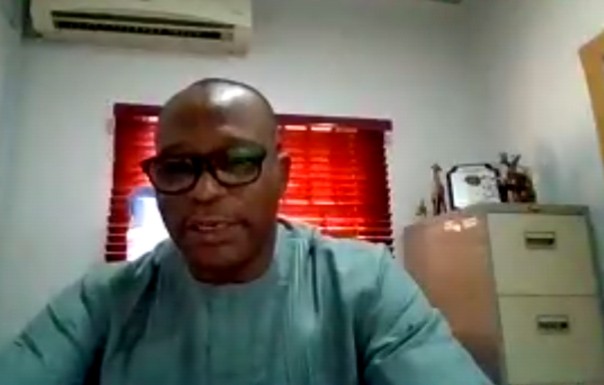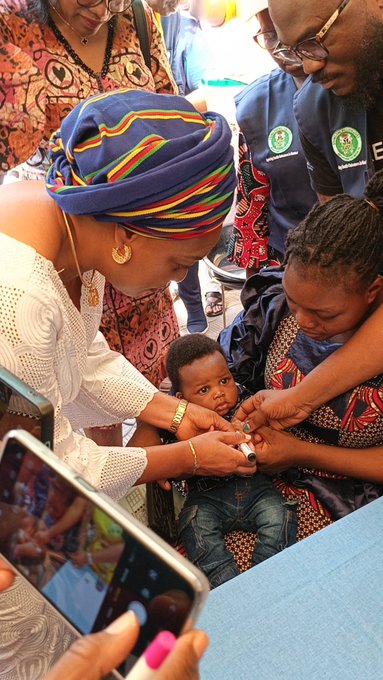Health
Expert Urges Media Practitioners To Prioritise Reportage On Sexual and Reproductive Health Service Uptake

Our Correspondent
Media practitioners have been tasked to give visibility to efforts by stakeholders in their advocacy drive for uptake of contraceptive and other family planning services for improved health outcomes in communities.
The call was made by a reproductive health expert, Dr. Ejike Oji at a just concluded Webinar stakeholders meeting to commemorate the 2021 World Contraception Day, organised by the Network of Reproductive Health Journalists of Nigeria (NRHJN).
Our correspondent reports that the Webinar meeting with the theme, ‘Contraception During Covid-19 and Beyond: Role of Government, Providers and Media in Ensuring Youths Are Safe, Not Sorry’ attracted over 80 participants drawn from Government, International partners, service providers, CSOs, Youth groups, Academia, Media and FBOs.
Dr. Oji described the media as the cement that makes the different in approaches of other key stakeholders in reproductive health into a whole that can have positive impact on set objectives.
Dr. Oji, who recalled the role media played in giving birth to the VAPP law that seek to checkmate incessant cases of SGBV, also commended members of the pen profession for their active participation during the midwife service scheme campaign, stressing that the future for NRHJN is bright.
The expert then called on all stakeholders to seek for information regarding reproductive health in order to carry out effective and efficient advocacy to target groups.
“We must ask for information like where to access services, what are the options to try, et al. This will equip us to advocate that contraceptive is the key to a healthy living.
“Family planning is one of the most individualised services because of the options it provides. There is a package for everybody base on everyone’s need.
“Not having the right information could lead to unwanted pregnancy, which leaves couples with either keeping the pregnancy or sometimes having unsafe abortions that may lead to lose of lives”, said Dr. Oji.
Dr. Oji, who also doubles as the BOT chairman of the Network and CSOs focal person of Global Family Planning 2030, said that one of the major causes of infertility in Nigeria is unsafe abortion.
He also disclosed that some modelling carried out revealed that contraception use reduces maternal mortality by 40 percent.
Earlier in her welcome remarks, national president of NRHJN, Yinka Shokunbi informed participants that formation of the NRHJN in 2010 was particularly as a result of the gap that existed especially with regards to getting out development messages and information on empowerment from sexual and reproductive health reports (SRHR), partners and allies to the people who really need the information for growth and societal development.
Shokunbi said that the noticeable gaps were in such a way that people meant to be beneficiaries of SRHR programmes never got the right and appropriate messages to make informed decisions that would result in changed behaviour or engage government in demanding for accountability and for a better society.
She maintained that the Network since coming into the Reproductive Health space has made significant difference to intended target audience.
“Since inception in 2010, the Network has been involved in various activities of interest such as advocacy for the de-criminalisation of the Abortion Laws in the Nigerian Constitution; Advocacy for the passage and domestication (at state levels) the Violence Against Persons Prohibition (VAPP) Law; Bring Back Our Girls (BBOG) Campaign; Campaign to end Endometriosis and Rights to Fertility Treatment; Advocacy for Availability of Family Planning Commodities, End to Female Genital Mutilation/Cutting and other Harmful Traditional Practices; Access to Breast and Cervical Cancers Prevention, Care and Treatment among several other reproductive health issues that affect women and girls and people with disabilities in Nigeria.
READ ALSO: Reproductive Health Journalists Mourn Sudden Demise Of BoT Member
“Over the past ten years, the Network continues to build on strength of its members to further support the society as the solution voice.
“Today’s event is a testament of what we do and will continue to do in our ten years of trudging on. We have brought key partners in government, providers, CSOs,FBOs, academia and we ourselves, media practitioners under this room to discuss and channel solutions to issues of contraception and contraceptives in the midst of covid-19 pandemic, insecurity and how young people can stay safe and not be sorry in life.
“For us as Network of Reproductive Health Journalists, we believe that when we bring an array of people like we have today, to jaw jaw, it is part of taking ownership of the raging issue. We are not restricting ourselves to the back of the burner to merely report what is happening, but we see ourselves as part of proffering solutions”, said Shokunbi.
While urging participants to lay it bare as it is, in a no-holds-bar manner , the president of the Network said that the current alarming state of insecurity is another level of concern as kidnappings, abductions go on daily and young girls fall victims of rape, sexual violence and the likes.
She further disclosed that, “all inputs presented during the meeting would be captured and published into a compendium to mark our 10th anniversary and to give back to the society a legacy from the stable of reproductive health writers and our perspective on how to be solution Journalists”.
Health
LASG FLags Off Polio Outbreak Response Campaign

The Lagos State Government, through the Lagos State Primary Health Care Board, has launched the 2025 Polio Outbreak Response Campaign, reaffirming its commitment to eradicating polio and safeguarding the health of its children.
The ceremony, held at the Simpson Primary Healthcare Centre, was led by the First Lady of Lagos State, Dr. (Mrs.) Claudiana Ibijoke Sanwo-Olu, represented by Mrs. Widad Jumoke Mustafa, a member of the Committee of Wives of Lagos State Officials (COWLSO).
In her address, the First Lady emphasised the state government’s proactive measures to keep Lagos polio-free, highlighting the critical importance of the campaign in preventing the debilitating effects of poliomyelitis, which can result in paralysis or death.
READ ALSO: IMPEACHMENT: Lagos Ex-Speaker, Obasa’s ‘Sins’ Revealed
The First Lady also called on parents, community leaders, and stakeholders to support the campaign by ensuring eligible children are vaccinated.
Targeting children aged 0-59 months, vaccination teams will administer the Oral Polio Vaccine (OPV) to prevent virus transmission.
Dr. Kemi Ogunyemi, the Special Adviser on Health, expressed gratitude to Lagosians for their continued cooperation in the fight against polio. While appreciating all healthcare workers and partners for their services, Mrs. Ogunyemi encouraged parents to present their children and wards for the exercise.
Also speaking, the Chairman of Lagos Mainland Local Government, Mrs. Omolola Rashidat Essien opined that Immunization is key in ensuring that children are kept safe from polio and other vaccine preventable diseases.
Dr. Abimbola Bowale, the Supervising Permanent Secretary, Lagos State Primary Health Care Board, who also spoke at the event, underscored the life-saving importance of immunization.
“All children aged 0-59 months need multiple doses of the polio vaccine to ensure full protection. Any child missed represents a potential risk for the poliovirus to spread. The vaccine is safe, effective, and crucial in keeping our communities polio-free,” he stated.
Dr. Bowale also outlined several strategies to ensure the success of the campaign, including fixed post teams stationed at primary healthcare centres and public health facilities, house-to-house visits, and a transit strategy to reach special locations such as places of worship, schools, motor parks, and other public venues.
The event concluded with Dr. (Mrs.) Claudiana Ibijoke Sanwo-Olu officially launched the campaign, marking a renewed effort to maintain Lagos State’s polio-free status.
Headline
Lagos Cholera Cases Rise To 421

The Lagos state suspected cholera cases have risen to 421.
The Commissioner for Health, Akin Abayomi disclosed this on his Instagram handle @profakinabayomi on Saturday.
“As of June 20, 2024, an additional four suspected cholera cases have been reported, as illustrated in the accompanying graph,” he wrote.
He noted that the Emergency Operations Centre in collaboration with all relevant partners is actively engaged in contact tracing, community-based surveillance, awareness campaigns, sample testing, and ensuring that confirmed cholera cases receive appropriate medical treatment.
READ ALSO: Two Suspects Arrested For Stealing Car From Mosque During Juma’at Prayer
On Friday, the commissioner confirmed 35 cases out of the 417 suspected cases and 24 deaths across 20 Local Government Areas in the state.
The cases were reported from Agege, Badagry, Ikeja, Mushin, Ajeromi-Ifelofun, Epe, Ikorodu, Ojo, Alimosho, and Eti-Osa.
Others were Kosofe, Oshodi-Isolo, Amuwo-Odofin, Ibeju-Lekki, Lagos Island, Shomolu, Apapa, Ifako-Ijaiye, Lagos mainland, and Surulere.
Cholera is a food and water-borne disease caused by ingesting the bacteria— Vibrio cholerae — in contaminated water and food. Cholera can cause severe acute watery diarrhoea, and the severe forms of the disease can kill within hours if left untreated.
In Nigeria, cholera is an endemic and seasonal disease, occurring annually mostly during the rainy season and more frequently in areas with poor sanitation.
READ ALSO: Police Arrest 28yr Old Suspected Cultists, Recover Gun In Delta Community
The World Health Organisation on Thursday announced a spike in cholera in several regions of the world, with almost 195,000 cases and over 1,900 deaths reported in 24 countries since the start of 2024.
WHO said the Eastern Mediterranean Region reported the highest number of cases, followed by the African Region, the Region of the Americas, the Southeast Asia Region, and the European Region.
The global health body, however, noted that there are no reported cases in the Western Region, according to its bulletin released on Wednesday.
It said it exhausted its global stockpile of Oral Cholera Vaccines by March but was able to exceed “the emergency target of five million doses in early June for the first time in 2024.”
Health
AUTISM: What You Need To Know

By Silver Yeibake
Autism, commonly known as Autism Spectrum Disorder (ASD), is a neurodevelopmental disorder that affects communication, social interaction, and behavior. Autism is referred to as a spectrum condition since it can manifest in a variety of symptoms and abilities. While the actual cause of autism is unknown, evidence suggests that genetic and environmental factors interact to influence its development.
The risk factors include a sibling with autism, advanced age of parents, exposure to certain air pollutants and pesticides before birth, extreme prematurity, mothers with diabetes, immune system disorders or obesity, any difficulty with delivery leading to deprivation of oxygen to the baby’s brain, fever during pregnancy, lack of certain vitamins minerals during pregnancy, and certain genetic conditions, such as Down, fragile X, and Rett syndromes.
“Risk factors can not on their own cause a disease. However, they can increase the likelihood of that disease in a person.”
It is important to know that contrary to trending claims online, there is no scientific or medical evidence that vaccines or consumption of sugar are risk factors for autism.
READ ALSO: Kidney Stones: What You Need To Know
Autism is defined by difficulties in social interaction and communication. Individuals with autism may struggle to grasp social cues, maintain eye contact, and engage in typical back-and-forth conversations. Some people may also engage in meaningless, repetitive actions, such as hand-flapping or rocking, and have strong interests in specific areas.
It is essential to remember that autism is a lifelong diagnosis, but with early intervention and adequate care, people with autism can live fulfilling lives.
Autism treatment frequently includes behavioral therapy, speech therapy, occupational therapy, and social skills training. Each individual with autism is unique, thus interventions should be tailored to meet their personal needs and strengths.
In spite of the difficulties that autism can cause, many people with autism possess unique talents and abilities. Some people may succeed in fields such as music, art, mathematics, or programming, thus it is important for society to acknowledge and honor the qualities and achievements of people with autism.
In summary, autism is a complicated and diverse disorder that affects individuals in various ways. By raising autism knowledge, understanding, and acceptance, we can build a more inclusive society in which people with autism can thrive and attain their full potential.
Dr. Yeibake, Weriwoyingipre Silver.
Senior Registrar,
Faculty Of Pediatrics,
WACP

 News5 days ago
News5 days agoSoyinka Decries Seyi Tinubu’s ‘Excessive’ Security Escort

 Metro5 days ago
Metro5 days agoEdo Assembly Declares Okpebholo’s Projects Unprecedented

 News5 days ago
News5 days agoWorld Human Rights Day: CSO Tasks Govt On Protection Of Lives

 News5 days ago
News5 days agoHuman Rights Day: Stakeholders Call For More Campaigns Against GBV

 News5 days ago
News5 days agoNAF Releases 2025 Recruitment Aptitude Test List

 News5 days ago
News5 days agoOPINION: Fubara, Adeleke And The Survival Dance

 News5 days ago
News5 days agoOut-of-school: Group To Enroll Adolescent Mothers In Bauchi

 News43 minutes ago
News43 minutes agoEdo Assembly Charges Contractor Handling Ekekhuan Road To Accelerate Work














